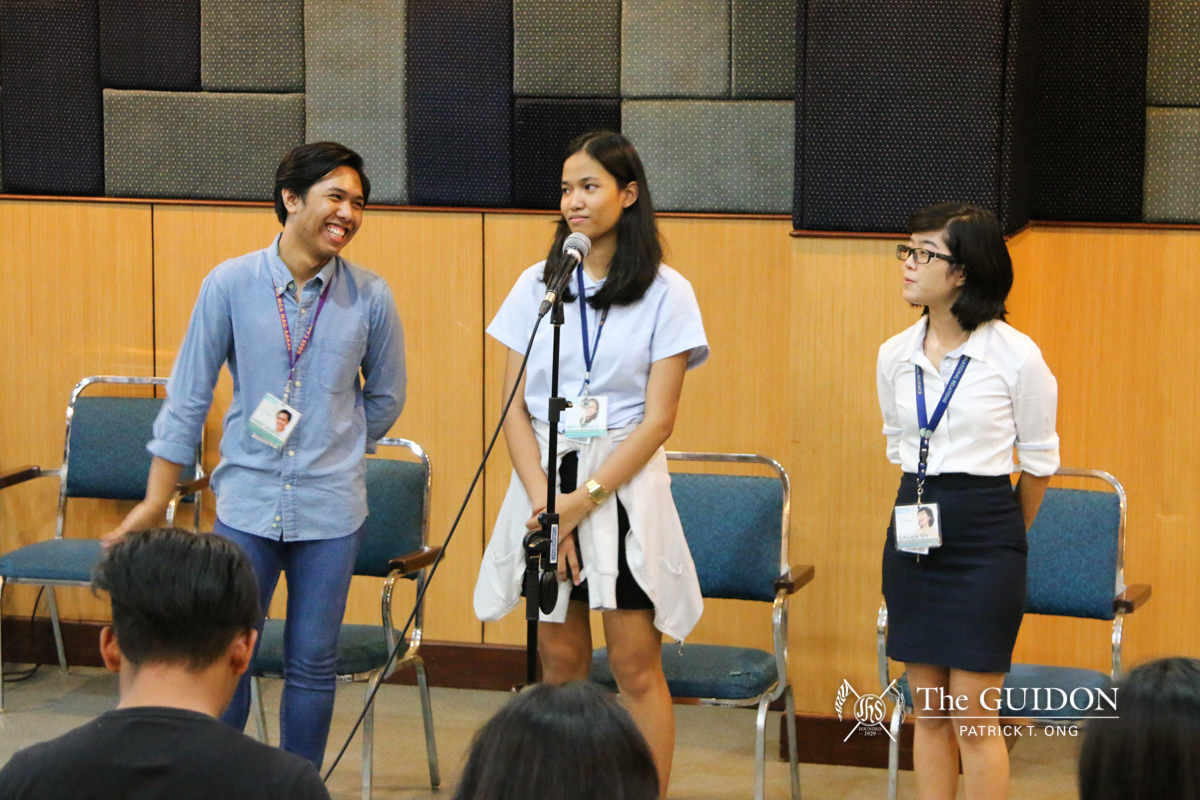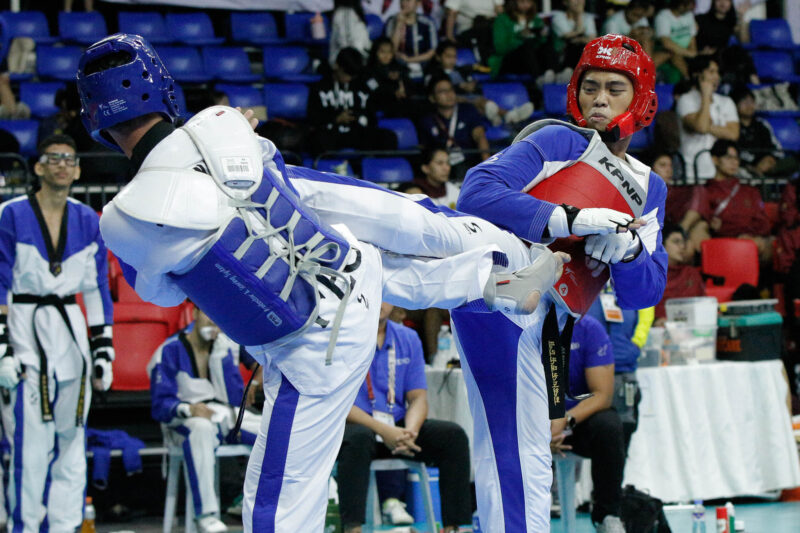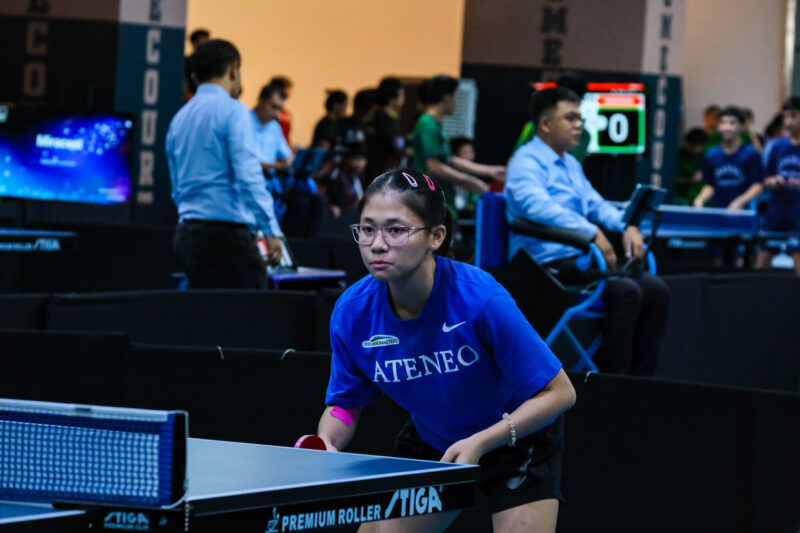GONE ARE the days of platforms stressing “school” or “batch unity” as candidates for Sanggunian school representatives (SR) faced tough questioning on a wide range of issues during last Monday’s SR Miting De Avance (MDA) and Debates held at Faura AVR.
Most questions were pooled online from the student body. Selected submissions, representing different sectors of the community, were asked by a panel composed of The GUIDON and Matanglawin editors.
In attendance were BUKÁS coalition SR candidates Ferdy Acosta, School of Humanities (SOH); Neicy Pilarca, School of Sciences and Engineering (SOSE); and Dasha Uy, School of Social Sciences (SOSS).
Monday’s debate was thus an all-BUKÁS affair after Union of Students for the Advancement of Democracy (USAD) SOSS candidate Hya Bendaña failed to attend the MDA due to “unforeseen circumstances.” USAD announced her withdrawal from the race the next day due to “personal reasons.”
In a Facebook post, Bendaña later explained that she feels “unworthy to represent” SOSS especially since she just recently shifted to the management economics program under SOSS from the management honors program of SOM. Despite this, she reiterated her support for her party.
Alec Lim, independent candidate for SOM, was also unable to attend the debate.
On sectors beyond their schools
Right off the bat, the SR candidates were asked regarding their plans on how to mobilize their constituents to respond to the increasingly-turbulent national situation.
Pilarca said that while she does sees the value of mass mobilizations, she thinks that SOSE can contribute more towards the “general direction of nation-building” through the research they do in their own disciplines. Pilarca also mentioned pushing for reducing the Loyola Schools’ carbon footprint as a response to climate change.
Uy said that there should “more creative ways to start engaging more people.” She also said that there is nothing that is holding her constituents back provided that constituents are given the proper avenues.
Acosta also said that there should be more avenues to be opened. He also said that the humanities can also respond to the national situation by using their art.
With regards to scholars’ concerns in the university, Uy said that the scholarship system should be “equal” to all students and that the tuition fee should not increase without basis or reason. Pilarca noted that financial concerns go beyond just tuition, and includes “everyday living” as an Ateneo student.
Uy added that to address this, she thinks the Sanggunian’s “very high” budget surplus can be tapped. Acosta said that they can also connect scholars with offices that hire student researchers and encoders.
Candidates were also asked on their stand regarding gender-neutral bathrooms for transgender Ateneans. Uy said that these gender-neutral bathrooms are a “need.” Acosta said that this issue highlights the urgency to “push for LGBT sectoral representation in the Sanggunian” so that they can know and lobby for their needs.
For Pilarca, there should be “more research and consultation” on the matter. Uy said that such gender-neutral bathrooms are a “need” and that people should be start more “progressive” in viewing issue.
With regards to sexual harassment, Uy said that there is a need for a “women’s desk” on campus, something she says is required by law but has not been implemented in the university.
She also said that there should be more spaces for women on campus, such as including more female writers in required readings in class. Acosta also said that there should be more “gender sensitivity classes” on campus to educate more Ateneans on the issue.
Pilarca also promised to “lobby [for] contractual workers and laboratory technicians in the Magna Carta [for Scientists].” This was after she was asked on the issue of the lack of hazard pay for some laboratory workers who are routinely exposed to dangerous chemicals.
She also mentioned an “Angat Agham” program that would involve and engage students with other stakeholders in the scientific community.
Acosta also said that there are many laborers in the Ateneo who do not receive what they deserve. He said that the Sanggunian has already lobbied investigations on the matter. Uy said that “the bigger goal” is to eliminate contractualization in the Ateneo, but concedes that this is difficult since there are still legal forms of contractualization in the country.
Lack of representation
On the issue of emerging organizations on campus, Pilarca said that some policies of the Office of Student Activities’ towards these groups are “unfair,” and that the solutions given are only “band-aid.” Uy also noted that the lack of public spaces are giving organizations a “hard time with reservations.” Acosta said that the Sanggunian is ready to “listen and engage” with the emerging orgs sector.
Acosta also addressed the issue of SOH’s lack of representation during the Ateneo Career Fair, a question which seemed to resonate with a lot of students in the MDA.
“I don’t think there is enough representation and not enough opportunities for SOH students at the Ateneo Career fair,” Acosta said. He said he will “engage the placement office” and tap the “wide networks” of the Ateneo Alumni Association on the matter. Acosta promised that he will lobby for a “more comprehensive” career fair.
He also stressed that humanities students can also be employed in many other fields. “Just because we’re in SOH doesn’t mean we are limited to art,” he said.
Concerns such as workload and the lack of “workshop-based” courses in the curriculum in information design and other SOH programs have also been brought up. Acosta said that he will “consult with the Fine Arts Department and bring it up with the School of Humanities.”
Acosta also plans to include a provision protecting intellectual property rights in the student handbook. He also plans a “SOH Think Tank” that would “empower the students [and] their innovative ideas and give them resources for these ventures.”
The candidates also said that they will protect students who may be subject to political harassment. Uy said that departments “do not have the right to step on students’ rights.” She plans to strengthen the Magna Carta to ensure that this happens.
Acosta said that that the Sanggunian can use their representative powers to bring up their concerns to the administration, while Pilarca mentioned that the Sanggunian Office of the Solicitor General may help students who encounter such harassment.
The future of BUKÁS
Uy also revealed the future of the BUKÁS coalition during the debate. In a question posed by Matanglawin editor-in-chief Rambo Talabong, Uy confirmed that there is already “a draft of the constitution” for BUKÁS but added that forming a political party is “a long term thing” that would need more consultations with the students if their platforms would indeed resonate.
Acosta mentioned that BUKÁS has a plan until 2020 and that he is looking forward for the coalition to become a party for these plans to be realized.
Meanwhile, Pilarca said that she think “the point of BUKÁS is so that we’re not very strictly held into ideologies” but that having a “long-term ideology” and “becoming a party” is something that they have to discuss.
“We’re focusing on what we can do right now, which is to get elected, make sure our platforms and let us see if that bigger vision is communicated to the students,” Pilarca said.
ERRATUM (posted March 26, 7:43 PM): An earlier version of this article stated that Alec Lim is the BUKÁS candidate for School of Management representative. He is running as an independent. We apologize for the oversight.




